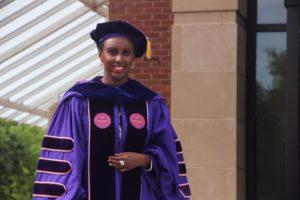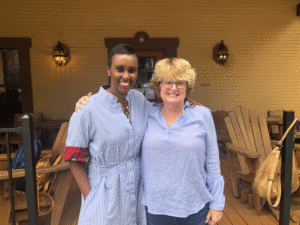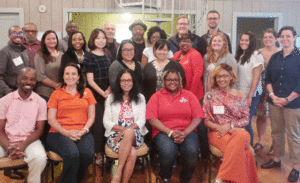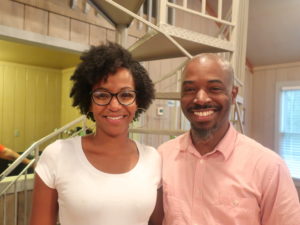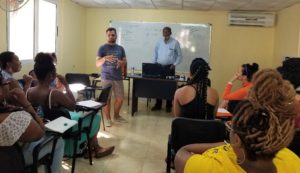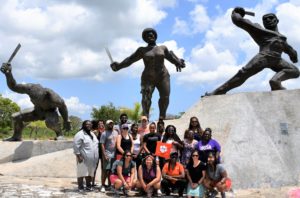Clemson Graduate Student Uses an Innovative Research Approach to Understand the Lives of Marginalized Persons in the Global South
Tourism is one of the world’s largest industries, responsible for the creation of one in five new jobs over the last five years, according to the World Travel and Tourism Council.
Most of those jobs are occupied by women, including in Africa. That said, job opportunities for men and women vary throughout the African continent, says E’Lisha Fogle, a doctoral student with the Parks, Recreation and Tourism Management program at Clemson University, with gender dynamics playing a role.
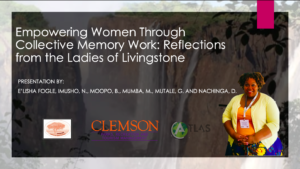
“A woman’s experience in the tourism industry throughout Africa is affected by underlying societal, cultural and political influences that affect how, where and when she could be involved in – and constrained by – tourism,” Fogle says.
Past research on gender and tourism in Africa has primarily focused on entrepreneurship, empowerment and other community-based initiatives involving women. Although those are important perspectives, Fogle is applying a different approach to understanding constraints to women’s participation in tourism and its related industries.
Fogle is analyzing these relationships through collective memory work, a research tool that addresses power structures, hegemony and inequality, with a goal of emancipation through discourse analysis. Members of the collective are able to deconstruct their own narratives, which, in Fogle’s research, also creates a safe space for personal growth and empowerment. Fogle believes this approach can play an integral role towards gender equality in the Global South, which includes most countries in Africa, Central and Latin America, Asia and some countries in Europe.
“Collective memory work is still emerging in Africa as a tourism research tool, as there are fewer women of color investigating these phenomena from an academic perspective,” says Fogle. “As a result, it has been relatively underutilized as a method to understanding issues affecting women in tourism spaces.”
Fogle spent a month in Livingstone, Zambia, between December 2018 to January 2019, with a group of six participants recognized by the collective memory work methodology as co-researchers. Fogle served as the group scholar with five female community members. Together, they used collective memory work to explore how gender could constrain female participation in the tourism industry. Her goal is to apply a new layer to existing research that can be used to help encourage confidence in the workplace among women and lead to better opportunities, both in and beyond the industry.
Fogle’s faculty advisor, Dr. Lauren Duffy, says that E’Lisha’s work focuses on an important topic that needs our attention. “Ensuring women have access to the tourism industry as a source of employment and income is vital in terms of providing the means for economic and social independence,” Duffy says. “E’Lisha’s research is pushing new boundaries methodologically and having a direct impact on the people and organizations she’s working with.”
Fogle’s impact on the Livingstone community goes beyond her academic research. Before she left for Livingstone last December, she raised $1,300 that was divided equally among six local organizations to purchase equipment and supplies, education materials and uniforms, and health and hygiene products for women and children.

Dollars were also used to address critical facility needs – for example, financial support provided to the Baobuyu Learning Center, which provides free schooling to young children in the Mwandi area, covered their water, sewage and electricity costs for an entire year, while also helping them prepare their roof for upcoming maintenance work. Kwathu Children’s Home, which operates an orphanage and free community school, was able to purchase food supplies for the first quarter of the year.
Fogle’s philanthropic efforts were supported by the Conservation and Tourism Society in Livingstone, with Society member Jacob Kampindu facilitating the relationships between Fogle and the participating organizations.
“It’s important to me to ensure that my research in Africa does more than benefit me as a scholar,” says Fogle. “The dollars we were able to raise provided direct, and immediate, benefits to the communities sharing their knowledge and insight with me, while also raising awareness of their work here in Clemson.”
Fogle is now back in Africa sharing her collective memory work research approach at two major tourism conferences – at the ATLAS Africa conference in Uganda, which explores innovations in tourism, and the Insaka 2019 Symposium in South Africa, focusing on transformative conservation. She’s hoping her presentations will raise awareness and encourage the use of collective memory work in tourism research.
“Understanding gender constraints to female participation in the tourism industry is critical, given the number of women working in the field. The collective memory work approach provides invaluable new insight into what opportunities and challenges women working in tourism are facing,” says Fogle. “My hope is that the more we share information about this research technique, the more female African researchers will begin to see the value in using it.”
